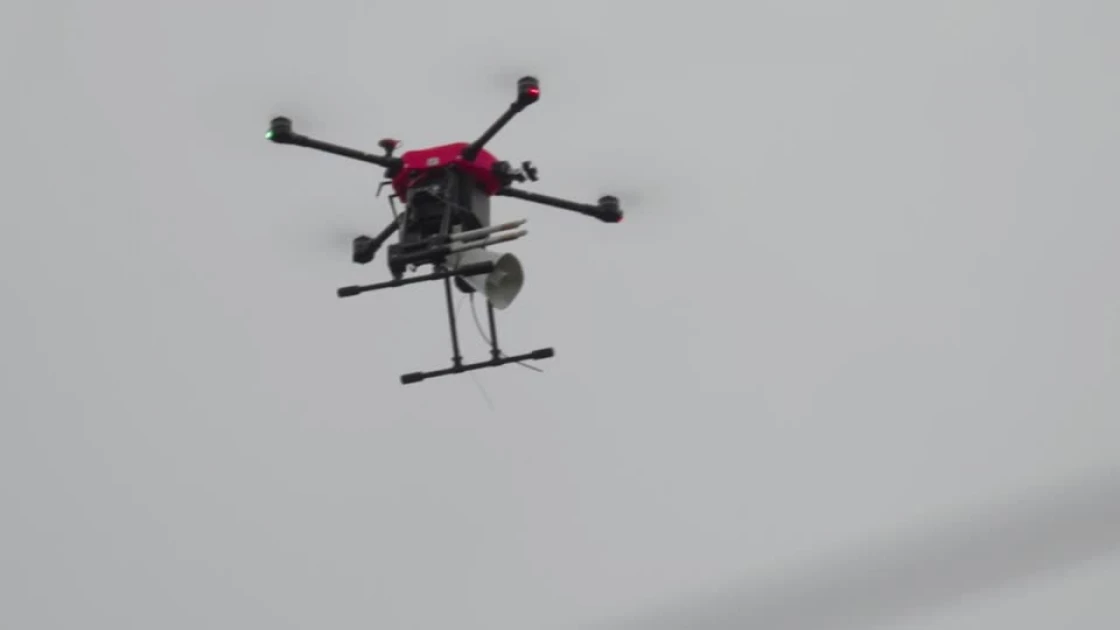Japan deploys barking drones to keep bears at bay as attacks increase


Audio By Vocalize
The device, officially dubbed a “Hunting Drone” by its developers at Aero Japan, begins emitting loud dog barking noises as it flies about in an orchard that has recently been wrought by frequent bear sightings.
At one point it manages to shoot off two loud firecrackers to further deter bears within the vicinity.
The improvised-looking device is a high-tech solution that the government of Japan’s central Gifu Prefecture has recently employed to stop bears from ransacking apples and peaches at the Fruits Park Kurouchi Orchard.
According to Naofumi Yoshikawa, an official at Gifu prefecture's environmental affairs department overseeing the trial, the drone was an “immediate” response measure to the increasing number of bear sightings in Hida, which have increased almost eight-fold this autumn compared to last year.
"Working out here, that fear (of bears) is always there," said Masahiko Amaki, the head of the local orchard cooperative, as the sound of the dog-barking drone rang out across the valley.
A bear warning sign at the head of a walking trail near the orchard, urged hikers not to trek alone.
Across Japan, a record 220 people have been injured in bear attacks in the year since April, according to public broadcaster NHK. Thirteen have died, including seven last month alone, a peak time as bears forage intensively before hibernation.
Many of these attacks have been in far-flung towns that overseas travellers rarely visit. But a recent attack by a bear cub on a Spanish tourist in Shirakawa-go, a UNESCO-listed village known for its picturesque thatched-roof houses about an hour’s drive from Hida, has made bear deterrence a top priority for the local government. Now the historical village is dotted with bear warning signs across many of its scenic alleyways.
On November 15, tourists impersonated growling bears as they posed for photos next to the warning signs, while the jingle of bear bells could be heard from the rucksacks of tourists like 25-year-old Cornelia Li who were taking the threat more seriously.
“When we were preparing for this trip, we saw on social media that there were a lot of Japanese news reports of bear sightings. It seems like this year’s harvest wasn’t very good so bears were coming down (to the cities) to look for food, so we prepared these two bear bells,” said Li, just after tying a bear bell to her 4-year-old daughter’s backpack.
Li and her family, who hail from Shanghai, opted to book hotels in cities rather than rural areas due to the bear risk, she added.
The United States, China and Britain last week issued travel advisories to their citizens on bear attacks in Japan. The U.S. alert warned about attacks near populated zones, noting that a park adjacent to its consulate in the city of Sapporo was closed for two weeks following a bear sighting.
While the tourist in Shirakawa-go escaped with minor injuries, according to Shiroki Mitsunari, the local official in charge of dealing with the bear issue in Shirakawa Village, which administers Shirakawa-go, authorities have since taken measures such as snaring bears in honey-laced traps, chopping down persimmon trees, and issuing warnings to visitors to walk in groups, wear bear bells and avoid certain areas after dark.
On November 14, Mitsunari walked to his office in Shirakawa Village’s main street, passing by groups of school children returning home for the day. According to Mitsunari, the students have all been given bear bells and told to walk home in groups to deter bears that tend to be most active in the early morning or around dusk.
“You know, we are living in the mountains and we are very, very familiar with the bears all the time, and then why can't I avoid that in the first place (a bear attack on a tourist)? And then that was yeah, pretty shameful for us. So, yeah, that was to saying, that was that part of me saying, we are not going to let that thing happen again,” said Mitsunari, who was born and raised in Shirakawa Village.
Asiatic black bears are listed as a vulnerable species globally, but their numbers are estimated to have tripled in Japan since 2012, helped by a decline in hunting. Experts say climate change has reduced harvests of bears' natural food like acorns and beechnuts, while the depopulation of rural areas and the proliferation of abandoned farmland have emboldened them to seek food near human settlements.
The situation has got so bad in the country's rugged north, that Japan deployed the army to help authorities cull bears earlier this month.


Leave a Comment